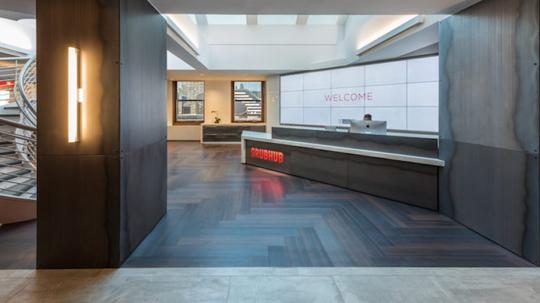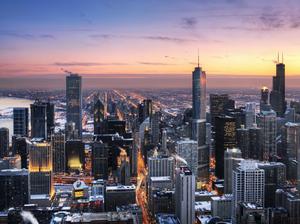
Forget aspiring to be a tech unicorn. Grubhub has entered "decacorn" territory.
Wall Street was pleased with Grubhub Wednesday after the company posted solid second quarter earnings results, beating estimates on both revenue and EPS. The Chicago food delivery company did $240 million in revenue last quarter, up more than 50 percent from the same time last year. It processed $1.2 billion in gross food sales last quarter, and saw an average of more than 423,000 orders per day.
As of Wednesday morning, Grubhub's stock was up more than 20 percent, climbing to a record high.
But amid all the figures that typically make executives and investors happy on earnings day was another milestone for the 14-year-old Chicago company---Grubhub is now a $10 billion business.
Grubhub's market cap has been flirting with the $10 billion mark all summer, eclipsing the figure in June only to see it dip back down. Grubhub's strong earnings report now has its market cap around $12 billion as the company continues to grow and hold off competitors like Uber and Amazon in food delivery.
Market cap, which you get by multiplying a company's shares outstanding by the stock's price, is used to measure the size and value of a public business. It can fluctuate when a company's stock price skyrockets or plummets. (Depending on when you read this, Grubhub's market cap could be much different than it is right now.)
But crossing the $10 billion threshold is a significant milestone for Grubhub, as well as the Chicago tech community at large. Grubhub is proof that a startup, founded by students at the University of Chicago, backed early by local investors, can grow to an IPO and eventually become a $10 billion (or $12 billion) company.
"It feels a little bit odd because, internally, we don't feel like a $10 billion public company," Dave Zaragoza, Grubhub's head of investor relations, said in an interview with Chicago Inno. "We kind of go out of our way to make sure that we’re maintaining our startup roots."
"You see the number on the screen and it is something that's exciting," he added. "I think externally it's certainly an indication of what people think about our success."
And Grubhub believes there's room for growth. Lots of room, in fact. The company estimates that $200 billion is spent annually in the U.S. on takeout and delivery. Compare that to the $4 billion-$5 billion Grubhub will do this year in gross food sales, and that leaves the company with plenty of potential customers who've yet to try the product. Grubhub owns 44 percent of the online food delivery marketshare, according to data from Bloomberg, followed by 15 percent for Uber, 12 percent for Postmates, and 9 percent for Door Dash.
In its earnings report, the company said it has 15.6 million active diners, up from 9.2 million this time last year.
"When you think about the total opportunity in the U.S., 15 million people really isn't very many at all," Zaragoza said. "The bigger opportunity for us over time is to raise awareness for our product, raise awareness of our brand, and attract many more diners to our network."
While e-commerce continues to disrupt countless industries across the U.S., food delivery is still done largely offline. Grubhub estimates that more than 80 percent of food delivery orders are still conducted over the phone. And as ordering habits shift, Grubhub believes its first-mover advantage will help keep the company ahead of other food delivery players.
"There's absolutely a first-mover advantage in this industry," Zaragoza said. "When you are the first mover there's a virtuous cycle that helps you sustain that growth ... given the density you have on both sides of the network."








